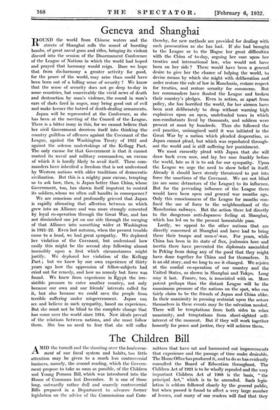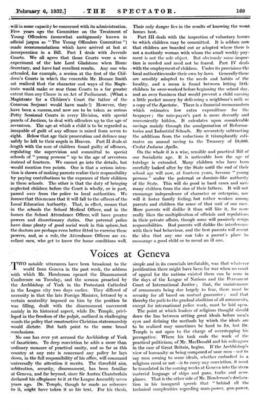The Chil dren Bill
A MID the tumult and the shouting over the bouieverse- ment of our fiscal system and habits, too little attention may be given to a much less controversial business, namely, the second reading, which the Govern- ment propose to take as soon as possible, of the Children and Young Persons Bill, which was introduced into the House of Commons last December. It is one of those long, outwardly rather dull and scarcely controversial Bills prepared in a Department to advance former legislation on the advice of the Commissions and Corn- mittees that have sat and hammered out improvements that experience and the passage of time make desirable. The Home Office has produced it, and to do so has evidently consulted the Board of Education throughout. The 'Children Act of 1921 is to be wholly repealed and the very important Children Act of 1908 is the basis, "the principal Act," which is to be amended. Such legis- lation is seldom followed closely by the general public, but when passed is found to affect a very large number of homes, and many of our readers will find that they
willii . some capacity be concerned with its administration.
• Five years ago the Committee on the Treatment of Young Offenders (somewhat ambiguously known in official jargon as" The Young Offenders Committee ") • made recommendations which have arrived at last at , incorporation in a Bill. Part I deals with Juvenile Courts. We all agree that those Courts were a wise _experiment of the late Lord Gladstone when Home -Secretary, and have had excellent results. Any one who attended, for example, a session at the first of the Chil- dren's Courts in which the venerable Mr. Horace Smith
• sat realized that the character and ways- of the Magis- trate would make or _mar those Courts to a far greater extent than any Clause in an Act of Parliament. (What a . Magistrate- for a Children's Court the father of the Common Serjeant would have made !) However, they . have been a success, and now are to be taken as serious -Petty Sessional Courts in every Division, with special 'panels of Justices, to deal with offenders upto the age of • seventeen. The age at which a child is to be regarded as incapable of guilt of any offence is raised from seven to :eight Below that age their prosecution and defence may safely be left to their angels in Heaven. Part H deals at length with the care of children found guilty of offences, . regulating the supervision and committal to special . schools of "young persons" up to the age of seventeen instead of fourteen. We cannot go into the details, but -would mention two points. One is that a serious inten- tion is shown of making parents realize their responsibility by paying contributions to the expenses of their children
• in these schools. The other is that the duty of bringing -neglected children -before the Court is wholly, or in part, passed over -from the police to local authorities. We forese-ethat thismeans that it will fall to the officers of the Local Education Authority. That, in effect, means that -in the schools the School Medical Officer, and in the • homes the School Attendance Officer, will have greater powers and discretionary duties. Our paternal police have done plenty of good social work in this sphere, but -the doctors are perhaps even better fitted to exercise these powers, and, as a rule, the Attendance Officers are ex- cellent men, who get to know the home conditions well. Their only danger lies in the results of knowing the worst homes best Part III deals with the inspection of voluntary homes to which children may be committed. It is seldom nor that children are boarded out or adopted where there is - not a motherly woman with whom the small weekly pay- ment is not the sole object. But obviously some"inspec- . tiOn is needed and need not be feared. Part IV deals - with the employment of children. Under its provisions the - local authorities make their own by-laws. Generallythose
• are sensibly' adapted to the needs and habits of the locality, and a mean is found between letting little children be over-worked before beginning the school day, and an over fussiness that would prevent a child earning a little pocket money by delivering a neighbour's milk or a copy of the Spectator. There is a financial memorandum which estimates low extra expenditure for the taxpayer ; the rate-payer's part is more decently and conveniently hidden. It calculates upon considerable savings mainly through the amalgamation of Reforma- tories and Industrial Schools. By accurately subtracting the additions from the reductions it triumphantly esti- mates an annual saving to the Treasury of £8,000.
• Credat J•rulaeus Apella.
On the whole it is a wise, sensible and practical Bill of our Socialistic age. It is noticeable how the age of tutelage is extended. Many children who have been carefully looked after by the State until the end of their school age will now, at fourteen years, become " young
• persons" under the paternal or dominie-like authority of the State. This will do good in hard cases and save many children from the sins of their fathers. It will not encourage independence of character or enterprise, nor will it foster family feeling, but rather weaken among parents and children the sense of that unit of our race. More parents will dislike it than will like it, for none -really likes the multiplication of officials and regulations in their private affairs, though some will passively resign responsibilities. Bad parents will dislike the interference with their bad behaviour, and the best parents will resent the idea that any one can take a parent's place to encourage a good child or to mend an ill one.









































 Previous page
Previous page